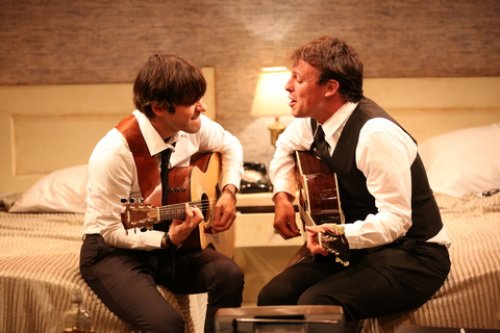Only Yesterday
Playwright Bob Stevens reunites McCartney and Lennon for one night only.

Tommy Crawford and Christopher Sears in a scene from Bob Stevens’ “Only Yesterday” at 59E59 Theaters (Photo credit: Carol Rosegg)
When it comes to our pop icons, the difference between truth and fiction is often a disingenuous matter of which stories we want to believe more. Beatlemaniacs, in particular, religiously cling to an idealized image of John, Paul, George, and Ringo that, six decades on, has changed very little, if at all. With the charmingly sentimental Only Yesterday, playwright Bob Stevens does nothing to upset this hagiography; in fact, he cleverly adds to it, undergirding his dewy-eyed suppositions with enough verifiable facts to create a type of verisimilitude that is tailor-made for enhancing our adoration of the ageless moptops–well, at least two of them.
In 1964, a hurricane waylaid the U.S. leg of the Beatles world tour, forcing the group to seek shelter in Key West, Florida. With lodgings at a premium, Paul and John found themselves divvying up a tiny room in a cheap motel, which would be a thoroughly trivial historical footnote if not for something Paul said much later in an NPR interview about “Here Today,” the heartfelt 1982 song he wrote a couple of years after John’s murder. Stevens begins Only Yesterday with a snippet from that interview in which Paul reveals what inspired the song: a long, stormy night in Key West when Paul and John had nothing else to do but drink and talk to each other.
Although the two Beatles had a lot in common, most notably an all-consuming love of American music, Paul said they grew closer during their Key West interlude not because of shared joy, but, rather, as is so often the case with a deep bond, through shared tragedy. Both Paul and John had lost their mothers at a tender age, and, spurred on by their prodigious bout of drinking, opened up to each other about the pain. Understandably, the real Paul was not very forthcoming about what was specifically said that night, but he does provide Stevens with just enough of an emotional entryway for the playwright to create his own extrapolation of how the evening progressed.

Tommy Crawford, Christopher Sears and Christopher Flockton in a scene from Bob Stevens’ “Only Yesterday” at 59E59 Theaters (Photo credit: Carol Rosegg)
Unfortunately, at around 70 minutes, Only Yesterday doesn’t have much narrative room for a proper buildup to Paul and John’s culminating discussion about motherly love and death. And, so, what they finally end up saying to each other in the closing scenes sounds trite, as if they were a couple of strangers rather than long-time friends whose relationship arrived at this point naturally. Perhaps Stevens, who is obviously a fan, couldn’t bring himself to be the one to define what might have been the most intimate exchange the two legends ever had.
Where Stevens succeeds admirably, however, is in earlier scenes centered on Paul and John’s reactions to their nascent fame. Less than a year removed from their earthshaking appearance on The Ed Sullivan Show, all John wants to do is end the tour and go home while Paul seems perfectly content to hang out in that dinky Key West motel room, strumming away on a guitar in an attempt to come up with the band’s next hit record. Of course, these personality differences are well-chronicled, which is probably why Stevens is much freer in dramatizing them. He’s fortifying history, not reinventing it.
As John, Christopher Sears is an enjoyable pill, perfectly offset by Tommy Crawford’s Paul whose amiable placidity is almost Buddha-like. More importantly, both actors have impressive musical chops, which wonderfully serves Stevens’ truncated overview of Paul and John’s tuneful reminiscing about their musical influences: Chuck Berry, Bobby Freeman, Gene Vincent. Sears even has the opportunity to do a bit of Elvis Presley hip swiveling that feels absolutely perfect in its oh-so-British imperfection.

Tommy Crawford and Christopher Sears in a scene from Bob Stevens’ “Only Yesterday” at 59E59 Theaters (Photo credit: Carol Rosegg)
What Stevens makes most clear about the married John is that, although just shy of his twenty-fourth birthday, he already felt the weight of the world on his shoulders. The much-lighter-spirited Paul brought him back to his youth, and the play is at its best when the two of them are both acting their age: bickering; having a pillow fight; annoying their put-upon road manager (a perpetually flustered Christopher Flockton). There’s also a delightful scene involving a determined adolescent admirer (Olivia Swayze) who becomes stuck in the air vent above Paul and John’s room. As her exuberant, disembodied voice fills the space, she endears herself to the two Liverpool lads and us to them.
Director Carol Dunne doesn’t try to add any complexity to the proceedings, instead relying heavily on the unflagging charisma of Sears and Crawford. She also receives solid support from scenic designer Michael Ganio whose motel room is suitably underwhelming, while Dan Kotlowitz’s lighting and Jane Shaw’s sound combine to create the impression of one hellacious downpour outside. Ultimately, though, Stevens’ play rises and falls on its own merits, which are just enough to make this slight entertainment enjoyable for even the most casual Beatles fan. But the play could have been a lot more.
Only Yesterday (through September 29, 2019)
Northern Stage
59E59 Theaters, 59 East 59th Street, in Manhattan
For tickets, call 212-279-4200 or visit http://www.59e59.org
Running time: one hour and ten minutes with no intermission






Leave a comment